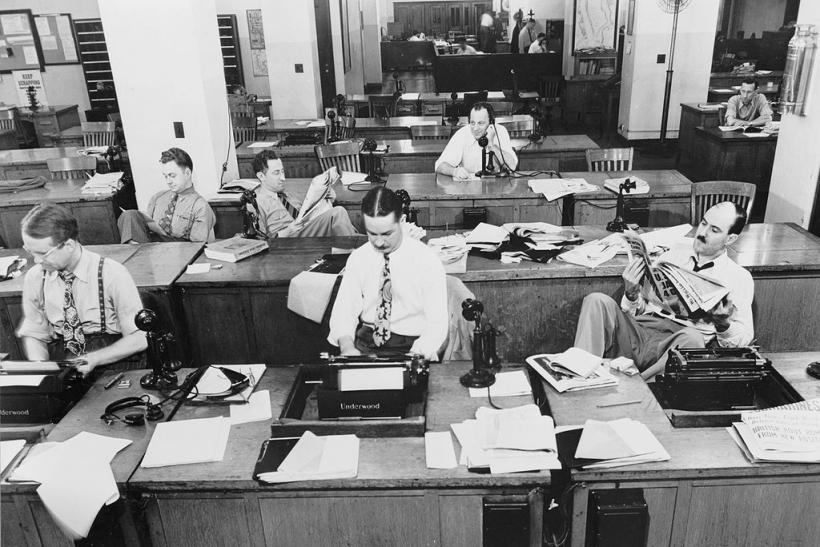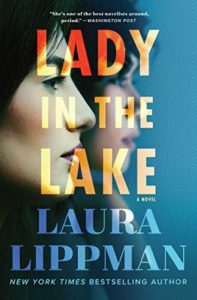
If there is one magical sound that is unfortunately disappearing off the planet forever it is the rumble of presses churning out printed copies of the day’s news in the bowels of a newspaper office building. Bestselling author, Laura Lippman took me back this week to that era before computers, before everything in newspapers was produced electronically, soundlessly and remotely — and when newspapers themselves were not threatened by extinction.
Lady in the Lake is the title of Lippman’s latest novel, published last week. It is the story of a 36-year old unfulfilled wife and mother who leaves her husband so that she can become a newspaper reporter. She follows a story that no-one else is interested in after the discovery of the body of a young black woman in a city park fountain.
Baltimore, 1966

The novel is set in Baltimore which is where Lippman worked as a newspaper reporter before turning her talent to writing novels. It is set in 1966. I don’t know Baltimore except from watching The Wire (which incidentally was created by Lippman’s husband, David Simon) but I do know the 1960s.
I came of age in the tumultuous 1960s. I love that I was an almost adult in that era — so much ground-breaking; so many old rules and ways cast aside. It was the decade of hippies and of protests and marches for changing the world, fighting for civil rights, women’s lib, and for ending the Vietnam war. I love to read anything about that decade (Summer of 69 by Elinor Hildebrand is also in my Kindle queue.)
I also love –and love to read about — newspapers. I landed my first newspaper job in the 60s (okay late 60s, very late 60s.) It was an internship at The Birmingham Post where the presses rumbled in the basement, and newspaper trucks sped away from the building’s loading dock in the early morning hours. These days production facilities are usually not located near newsrooms. Nor are newsrooms smoke-filled, grimy, noisy places with the sound of typewriters adding to the cacophony of reporters yelling into phones.
No-Brainer Reading Choice
 That’s how it was back in the 1960s and the 70s. So, Lady in the Lake was a no-brainer reading choice for me.
That’s how it was back in the 1960s and the 70s. So, Lady in the Lake was a no-brainer reading choice for me.
While the story is a murder mystery, or rather two murder mysteries set against a backdrop of the racial tensions of the mid 1960s, it is also depicts the status of women in that era in general, and specifically in the male-dominated world of daily journalism.
The female protagonist, Madeline “Maddie” Schwartz finds her way into a clerical job on the Star after finding the body of a missing 12-year old white girl. Determined to become a reporter, she starts nosing around a story that no-one else seems interested in — the discovery of another body, this time that of Cleo, a young African-American nightclub hostess. But Maddie’s persistence makes a number of prominent, wealthy men (both white and African-American) very uncomfortable: from the hack police beat reporter whom she bests on a story to the African-American owner of the nightclub to the gay legal aide of the governor seeking re-election.
Maddie gets nicknamed “Scoop.” It’s a nickname that’s used disparagingly. She is treated dismissively by the male columnist (“that’s not how it’s done, Lois Lane.”) The hack police beat reporter has a meltdown when she files a story that encroaches on his turf — even though he doesn’t know how to write and (in the era of “get me re-write”) always phones in the facts rather than writing the story himself.
Motives & Men

More significantly, Lippman nails it with the reaction to Maddie’s theory for Cleo’s death. Maddie believes she has found the motive for Cleo’s death in her affair with a married political candidate which she figures would be a scandal that would ruin the candidate’s chances. But she is told to move on: Nothing to see here.
“Men kept each other’s secrets. Men put men first,” Maddie reflects. “The world kept telling her to look away, to pay no attention to an age-old system, in which men thrived and inconvenient women disappeared.” One must surely be forgiven for immediately thinking about the real-life 1969 incident when Ted Kennedy escaped literally and politically from the consequences of a young girls’ drowning death on Chappaquiddick.
Aside from the nostalgia, Lady In The Lake provides a superb, fast-paced read. Nothing is as it seems: What really happened to Cleo? Who really killed Tessie, the 12-year old whose body Maddie finds. Lippman intersperses Maddie’s POV with the POVs of the people Maddie meets and interviews. It’s an interesting, maybe even ground-breaking technique, and provides a glimpse into the lives of characters Maddie meets but doesn’t delve deeply enough into. The novel ends with a stealthy, clever twist that creeps up on you and that I didn’t see coming at all.
Newspaper Life

The two murders in Lady In The Lake are based on real-life murders, one that happened in 1969. Lippman in a wonderful, wide-ranging interview about writing the novel says she was 10 years old at the time. “There I was 10 years old… I didn’t know kids could be murdered.” In the interview, Lippman also reveals that Nora Ephron’s article in her book, Scribble, Scribble, about working for The New York Post as a rookie reporter “informed a lot of my ideas about what newspaper life would have been for Maddie in the early 60s.”
Lippman adds: “I don’t think people have any idea how loud newsrooms were when everybody was on their typewriter… and there were the wire machines , the AP (Associated Press) and UPI (United Press International) machines which would ring. We’d actually have alarms going off when a big story was happening.”
Rolling Presses
And, she talks about the presses rolling, specifically about a scene of the presses rolling in Spotlight the movie about Boston Globe’s investigation into pedophile priests in the archdiocese. She tells how she was was watching the movie at home when her six-year old daughter wandered into the room.
“She saw me watching the last five minutes of the movie when the presses are rolling, and the story’s finally going, and they’re telling you what happened. And she said, ‘What is this?’
“I said, ‘It’s a movie about a newspaper,’ and she said, ‘You mean like the place where you and Daddy worked?’
“I said yes, and she said, ‘Can I ever work in a place like this?’ And I said no and I burst into tears.”
Reading that line, I, too, burst into tears.
Please click the Like button if you enjoyed this
Another winning post Joanna!! You succeeded in making me want to read this book 😀
Yes, it’s a really super read, Eldon. I’m happy you enjoyed my review.
I can’t wait to read Lady in the Lake. Baltimore is my hometown. 🙂
Yes, but you were hardly around the year this action takes place!!!!!!! I think you’ll love this book.
Ahhh, the wonderful 60’s !
I love books written about the 60 s.
Lady in the Lake. Sounds great!
Thank you Joanna!
Yes, definitely a great decade, Sandra. It makes me smile, though, when some reviewers call these novels set in the 1960s “historical fiction!!!!”